This research was done for our morning tea guide. Check it out for a summary of the tea research, as well as information and advice on slave-free coffee, biscuits, hot chocolate, sugar, and cordial.
Updated November 2023.
Want to make sure your morning cuppa is free of child labour and forced labour? This article will tell you how! Jump through to our recommendations section or start at the beginning to learn why this is an important issue.
Table of Contents
Issues
On the whole, forced labour and child labour are significant issues in the production of black, green and rooibos teas; these issues seem to be less common in herbal and fruit teas, and are very unlikely in peppermint or spearmint tea.
Black and green tea
Black tea (the tea you’ll find in English breakfast or Earl Grey tea) is made from the same plant as green teas, so we cover the issues in their production together. We’ll just refer to them as ‘tea’.
Some tea is grown by smallholder farmers, particularly in Kenya and other countries in East Africa but the majority is grown on large estates in China, India and Sri Lanka. Tea requires a lot of land to grow, so is often grown in rural areas far from law-enforcement officers. It is also a labour-intensive crop, and the prices it sells for vary considerably. All of these factors mean that it is a crop where child labour is commonplace and forced labour is not infrequently used.
Of the world’s top 10 tea producing countries, child labour is a particular issue in Kenya, where around 15% of the workforce are estimated to be children. China, India and Turkey are also considered likely to use child labour in their tea industries. Children are involved in actual farming (planting, weeding, picking tea, applying fertiliers etc.) as well as gathering firewood for tea-processing factories.to workers
Forced labour in the tea industry is less well documented, but is considered a risk in seven of the top ten tea producing countries: China, India, Kenya, Sri Lanka, Turkey, Indonesia and Bangladesh.
Rooibos (red bush) tea
Rooibos tea is at significatnt risk of child labour in its production. It is essentially all grown in South Africa, where child labour is known to be used in agriculture.
Other herbal and fruit teas
Evidence of human welfare issues in herbal and fruit teas is much less well documented and it is difficult to be confident how much of an issue this is. We have only been able to find concrete information on one herb, peppermint, and that seems generally to be at low risk of child labour and forced labour. That’s because 70% of the world’s peppermint and spearmint are grown in the US. The US tends to have strong and well-enforced labour laws, making fored labour unlikely. Child labour is known in US agriculture, but seems to be confined to the tobacco industry.
In general, herbal and fruit teas seem to be at much lower risk of child and forced labour than are black, green or rooibos teas. However, because the ingredients in these teas tend to be perishable products with volatile prices, there is some risk of labour abuses in their production. The only excpetions to this are pure peppermint and pure spearmint teas.
How can you identify slave-free tea?
Just Kai has looked at all the ethical claims and certifications we were able to find on tea sold in New Zealand supermarkets, health food stores and commercial supply companies. Some turned out not to be very helpful at identifying slave-free tea but we were able to identify some trustworthy ones as well. We’ll look at actual certifications first, then at uncertified claims made by brands.
Certifications
We found the following certifications in use: WFTO, Fair for Life, Fairtrade, Rainforest Alliance, Fair Wild, Ethical Tea Partnership and BCorp. Of those, we recommend all but the Ethical Tea Partnership and BCorp, but we think that WFTO, Fair for Life and Fairtrade are the best.
Recommended certifications: the A list
WFTO
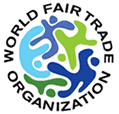
Unlike some other certifications, WFTO doesn’t issue different standards for different commodities. However, you can be confident all WFTO-certified products have involved:
- no forced labour or child labour
- sufficient payment that all workers can receive at least a living wage (calculated for that country or region);
- safe working conditions
We are confident that WFTO certified tea is free of child and forced labour and that the workers received decent pay and conditions. The only WFTO certified tea we are aware of in New Zealand is the Trade Aid tea range.
Fairtrade
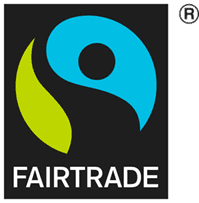
All Fairtrade certified products have been subject to audits to check that no child labour or forced labour was used on the farms where they were grown (and any instances found are remediated); there have also been audits to check that various health and safety standards were adhered to. Growers are also paid a premium that is to be used for things that benefit the community and, in some cases, sustainability projects.
Most Fairtrade certified commodities are subject to a minimum price (which is set at a level that means the producers earn enough to live) BUT this is not the case for herbal teas. For herbal teas, a buyer must simply pay 15% more than they otherwise intended to (which seems like a system very open to abuse). For black and green teas there are a range of minimum prices that apply based on the region in which the tea was grown and the type of tea concerned.
The lack of a minimum price is less of an issue for herbal teas that are grown on plantations, as plantations are required to be progressing towards a liveable wage for all staff (as well as having other required benefits, such as sick leave and holiday pay). However for herbs grown by smallholder farmers there are no such requirements, so these farmers could well be being paid less than they really need to live on.
In general, we believe you can be confident that any Fairtrade certified tea was produced without child labour or forced labour and in decent working conditions. In the case of black and green teas, you can also be confident a fair price was paid, enabling decent wages. This may well not have been the case for herbal and fruit teas with Fairtrade certification.
The only tea brand commonly seen in supermarkets with Fairtrade certification is Scarborough Fair. Clipper tea (found in health food shops) is also Fairtrade certified, as are several of the brands available to the corporate market.
Fair for Life
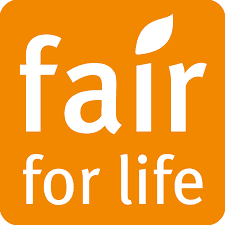
Fair for Life certification is rarely seen in New Zealand, but some of the Pukka tea range has it. It is broadly similar to Fairtrade in terms of the benefits workers are offered (sick leave, holiday pay etc.), and it involves audits to check for forced and child labour and safe working conditions. It also requires that all workers are paid at least a living wage by at least the third year after a given farm becoming certified. Lastly, a given auditor can only audit a given farm for three years in a row, which likely reduces corruption.
We are confident that Fair for Life certified tea is free of child and forced labour, that the workers had reasonable working conditions and that most workers were adequately paid.
Recommended certifications: the B list
We are confident the following certifications do a good job at preventing child labour and forced labour; however they do not ensure workers have as good working condtions as those listed earlier. We still recommend these certifications, but advise you to purchase products certified with A list certifications where you are able.
Rainforest Alliance
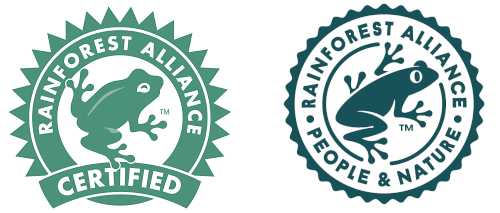
Rainforest Alliance certification is currently in the process of merging with the certification UTZ. You will more commonly see one of the Rainforest Alliance logos on these products, but you’ll still sometimes see a UTZ logo. They all mean the same thing.
Rainforest Alliance certified teas are subject to regular audits to check for child labour and forced labour, and all producers must have remediation processes in place for any cases that are found. Hired workers (who make up the majority of the tea workforce) must be paid at least the relevant legal minimum wage. Producers are required to be working towards paying a living wage (although there’s no time-frame required for this), and large producers (who dominate the tea industry) must increase wages annually at least in line with inflation. There are also various requirements for days off, breaks, health and safety etc. but no requirements for producers to give workers annual leave or sick leave.
The Rainforest Alliance logo is used widely on tea products.
Fair Wild
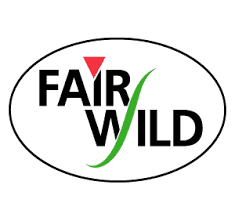
Fair Wild certifies wild-harvested herbs to both environmental and social standards. We trust those standards to be OK from a human welfare standpoint as Fair for Life sees them as having equivalent standards to their own, but we have been unable to find standards documents online to check in detail. We are confident they will be checking for child labour and forced labour, but are unsure what else will be important to them. Some of the Pukka tea range is Fair Wild certified.
Certifications we don’t recommend
Ethical Tea Partnership
The Ethical Tea Partnership is a group composed of many major tea brands. They aim to improve the economics of tea (which could reduce rates of forced labour and child labour) as well as to work towards equality for women and young people and improve environmental sustainability. However, while they provide guidance and training in these areas, no companies within the partnership are required to adhere to any particular standards with regards to human rights.
We have no reason to believe teas bearing the Ethical Tea Partnership logo are reliably produced without forced labour or child labour and do not recommend them. You’ll see their logo on Twinings tea packets as well as on the websites of some other brands sold in New Zealand.
B Corp
B Corp certifies a wide range of organisations that “meet the highest standards of verified social and environmental performance, public transparency, and legal accountability”. However, these standards are very weak when it comes to treatment of even directly-employed workers, and there are no requirements to eliminate worker abuse from their supply chain.
We have no reason to believe B Corp certified teas are reliably produced without child labour or forced labour and we do not recommend them. However, some of the Pukka tea range have Fair for Life or Fair Wild certification as well as B Corp certification: those will be slave free.
Claims by brands (made without certification)
Dilmah
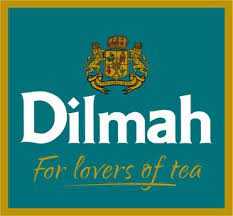
Dilmah tea markets itself as ethical tea, but has no independent certification. In general we wouldn’t support such a company, but in this case we do believe that their tea is reliably free of labour abuses and, indeed, looks after its workforce reasonably well.
Dilmah makes very concrete claims in regards to the treatment of their workers. They have a human rights policy that prevents child labour and forced labour and ensures workers receive a legal minimum wage. Suppliers are required to adhere to the same basic standards. Directly employed workers (which includes the vast majority of tea pickers) receive a range of other benefits such as schools for their children, low interest housing loans, holiday pay, funeral allowances etc. This is paid for from a foundation; 15% of pre-tax profits go to the foundation for this purpose. Tea pickers in Sri Lanka receive a legal minimum wage of 1,000 rupees per day (similar to the average wage for daily workers). This isn’t quite enough for a living wage (that’s around 27,700 rupees per month), but Dilmah also give each worker roughly 1,440 rupees per month worth of additional benefits*, which does help to close the gap.
*Calculated by us from 15% of pre-tax profits and number of workers.
As you can see, unlike many companies that claim to be ‘ethical’, Dilmah makes very concrete claims, many of which are easily verifiable. In addition, they are a large company and are located in a country that is both easy and desirable for Western journalists to visit. Were these claims untrue, we would expect journalists to have reported this. We have looked for such reports many times over the last 5-10 years and have never found any - only numerous positive ones. The worst thing we were able to find was a story by the International Labour Organisation about the child of a Dilmah tea plantation worker. After a family tragedy the child had dropped out of school and the ILO became concerned they were at risk of child labour. There was no suggestion in the article that the child ever worked for Dilmah. Also, while it’s not directly relevant, we like the way they’ve donated free tea bags to all Hospice New Zealand facilities since 1997.
We are confident that Dilmah tea is free of both child labour and slave labour and that their staff are treated well. We also like that Dilmah tea is fully processed in Sri Lanka (right through to final packaging), as that maximises the number of good Dilmah jobs available to Sri Lankans. We recommend all Dilmah products.
Other claims
The following brands all appear to be uncertified, but we checked their websites for any claims about the treatment of workers in supply chains: Healtheries, Choysa, Chanui, Arkadia, Higher Living, Ti Ora. Of these, we only found one claim that seemed relevant to worker treatment:
- Ti Ora uses only Rainforest Alliance certified green and black teas in their blends. Each blend also includes at least one other New Zealand sourced-ingredient, which we consider slave-free due to the strong and well-enforced labour laws here. However, a number of their blends also include rooibos. This is a herb at high risk of slave labour in its supply chain; as Ti Ora do not use certified rooibos, we do not consider their rooibos blends to be slave free. We consider all their non-rooibos blends to be likely to be slave free, and we particularly recommend those that only include the following ingredients: green or black tea, New Zealand sourced herbs, spearmint or peppermint (which are likely to be US grown). Their kawakawa with peppermint and spearmint blend seems to be the only one currently meeting those criteria, but all their other non-rooibos teas are also likely to be OK.
We also noted that Bell Tea is a member of the Ethical Tea Partnership, discussed above. We do not consider this sufficient for their products to be reliably slave free and so we only recommend the items in the Bell range that are Rainforest Alliance certified.
What do we recommend?
Our recommendations are listed below, first organised by brand, second by product type. Note that, if you are looking for tea for commercial or corporate contexts (e.g. tea in 2kg boxes, or single-serve sachets for your motel) these are listed here.
Recommendations by brand
For some brands we are confident all their products are free of child and slave labour: these are listed first. Those where we are only confident of part of the range are listed second.
Fully recommended brands
All products from all of these brands are free of child and slave labour and give workers safe working conditions. Those on the A list, however, go beyond that by offering other benefits such as decent pay, annual leave etc. If you are able to buy those, that’s even better :-)
The A list

- Trade Aid. Available in their own stores, online or from some supermarkets and health food shops. Trade Aid is certified through WFTO. They sell loose leaf black, green and rooibos tea and tea bags of Earl Grey, English breakfast, masala chai and green tea.
- Dilmah. Widely available at supermarkets, with some more speciality products available online. They sell black teas (including Earl Grey, flavoured teas and decaffeinated tea) in both looseleaf and teabag form; green teas (plain and flavoured including jasmine tea); and a small range of herbal tea. Their online offerings include white teas and oolong teas.
- Scarborough Fair tea is available at supermarkets. They sell green and black tea as tea bags, all Fairtrade certified.
- Clipper tea is at UK brand available at many health food shops here. Their whole range is Fairtrade certified. They sell various black teas (including Earl Grey), white tea, green tea (some with flavours) and some herbal and fruit teas. Their range all comes in tea bags.
The B list

- Countdown own brand tea is Rainforest Alliance certified, although note that the tea in their ice tea drinks is not. They do black, English breakfast and green tea as well as peppermint and chamomile.
- Pams classic tea is Rainforest Alliance certified.
- Taylors of Yorkshire tea is Rainforest Alliance certified - their black tea teabags are sold in many supermarkets here.
Partially recommended brands
- Some Pukka teas are Fairtrade certified and these are the only products we recommend. Other products have certain ingredients that are Fair Wild or Fair for Life certified, but we haven’t found any where all risky ingredients are certified by one or other of those organisations. If you do find any (they sell a huge range of tea and we may have missed some!) please let us know, but at this stage we only recommend their matcha green tea and their chai tea, both of which are Fairtrade certified. Look for them in health food shops and some supermarkets.
- Some Bell teas are certified by Rainforest Alliance: these include original, pure green, English breakfast and Kenya Gold.
- Some Nerada tea products are certified by Rainforest Alliance: black tea (in loose leaf and tea bag form - made from Australian-grown tea), vanilla rooibos, peppermint. Look for them at your local supermarket.
- Some Red seal teas are certified by Rainforest Alliance (although they are currently - October 2021 - still using the old UTZ logo for these). Certified teas include their green tea (and green tea with lemon and ginger), their ’functional tea’ range and most of their herbal blends including rooibos and rooibos chai. All sold as tea bags; look for them in your local supermarket.
- All the green and black teas from Royale Kitchen (but not their chamomile or peppermint) are Rainforest Alliance certified. Note this is a recent change (Nov 2023) and their website is yet to be updated to reflect this.
- Ti Ora teas that do not use rooibos (see more here).
- T2 organic English breakfast. This is Fairtrade certified: no other T2 products are Fairtrade certified, including their many non-organic English breakfast options.
Recommendations by product
This section is organised into black and breakfast teas, then green teas and lastly herbal and fruit teas.
Black and breakfast teas
- Trade Aid English breakfast, masala chai and Earl Grey tea (all available as tea bags, English breakfast also available loose leaf).
- Dilmah make English breakfast, Earl Grey and decaffeinated tea at many supermarkets, in both tea bag and loose leaf form. They also have a Ceylon Bold offering, and several flavoured black teas. Online they sell white and oolong teas as well as those with chai spice.
- Scarborough Fair black tea, sold in boxes of 100 tea bags.
- T2 organic English breakfast. This is Fairtrade certified: no other T2 products are Fairtrade certified, including their many non-organic English breakfast options.
- Clipper tea make Earl Grey and English breakfast tea bags, also white tea tea bags.
- Bell tea original, English Breakfast and Kenya bold tea bags (in boxes ranging from 24 to 200 tea bags; original and Kenya bold also come in 250g boxes of loose leaf tea.
- Countdown own brand black and English breakfast tea (come in boxes of 25, 50 or 100 tea bags).
- Pams classic tea in boxes of 30 or 100 tea bags.
- Nerada tea black tea (comes in both loose leaf and tea bag form) but not their chai tea (which is uncertified).
- Taylors of Yorkshire black tea (boxes of 80 or 100 tea bags from most supermarkets)
Green teas
- Trade Aid green tea, available loose leaf or as tea bags.
- Dilmah make plain green tea as well as decaffeinated green tea and green tea infused with herbs or spices such as jasmine, mint and ginger. Loose-leaf options available online.
- Scarborough Fair green tea, sold in boxes of 50 enveloped tea bags.
- Clipper tea make plain green tea as well as green tea with chai spice and green tea with lemon and ginger, all as tea bags.
- Countdown own brand green tea (comes in a box of 50 tea bags).
- Bell pure green tea (availabe in boxes of 24 or 50 tea bags)
- Red seal green tea, green tea with lemon and ginger and their green tea based ‘immunity tea’ are all Rainforest Alliance certified, but their other green tea blends are not. Red seal teas are sold in tea bags and are widely available from supermarkets.
- Ti Ora infused green teas, such as green tea with ginger, lemongrass and kawakawa and green tea with peach, passionfruit and kawakawa. Look for them in your local supermarkte.
- Pukka green tea with matcha.
Herbal and fruit teas
- Dilmah make a small range of herbal and fruit teas in supermarkets and a much wider range online.
- Clipper tea make both peppermint and chamomile tea as well as detox and ‘snore in peace’ blends.
- Nerada tea vanilla rooibos tea and peppermint tea, but not their other herbal and fruit teas (which are uncertified).
- Countdown own brand peppermint and chamomile tea bags.
- Red Seal ’functional teas’: cleanse, relaxing, immunity, sweet dreams and zen. The following Red Seal herbal blends: rooibos, rooibos chai, peppermint, chamomile, black adder and mi chai.
- Ti Ora herbal infusions, so long as they do not include rooibos. these include peppermint, spearmint and kawakawa and chamomile with lemon, honey and manuka.
- Pukka vanilla chai (note that this is just spices, not black tea infused with spices).
Products for commercial/corporate customers
single-serve enveloped tea bags and sachets
- Dilmah sell a wide range of teas in sachets including black, green, Earl Grey, decaf black, chamomile, peppermint and fruit teas. They also sell suitable display boxes.
- One sell Fairtrade certified sachets of black, English breakfast, green teas, along with suitable display boxes.
- Scarborough Fair sell Fairtrade certified enveloped tea bags of green, black, English breakfast and Earl Grey tea in boxes of 500.
- Royale Kitchen enveloped tea bags are available from The Starline Group. They have lemon and jasmine infusion tea bags in boxes of 100, and Earl Grey, English Breakfast and Premium Ceylon in boxes of 500. Rainforest Alliance certified (although the website wasn’t updated to reflect that when we checked in November 2023).
- most Sir Thomas Lipton enveloped tea bags are certified through Rainforest Alliance. These include Earl Grey, green tea, English breakfast (in packets of 25 through to 500 envelopes) and their classic yellow label black tea in packets of 500 or 1200 tea bags. They also sell a wide range of flavours in packets of 25 tea bags, including forest berries, black decaffeinated tea, French Earl Grey and several flavoured green tea. The only teas they sell that are not certified (and hence not recommended) are their peppermint, chamomile and lemon infusions.
teabags and loose leaf tea in commercial quantities
- Trade Aid sell 1kg bags of loose leaf rooibos tea and boxes of 500 English breakfast teabags. They welcome wholesale enquiries.
- Scarborough Fair sell loose tea bags of black, English breakfast and Earl Grey tea in boxes of 500. These are Fairtrade certified.
- Bell sell boxes of 200 Earl Grey tea bags or 500 English breakfast tea bags that are Fairtrade certified. Look for them at office supply stores.
- Choysa boxes of 500 ‘classic’ tea bags and their 2kg boxes of ‘classic’ loose leaf tea are Rainforest Alliance certified. Look for them at office supply stores.